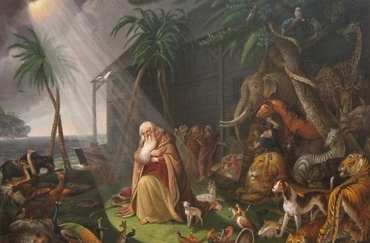Apocalypse Revealed #862
862. We have said that the nations' surrounding the camp of the saints and the beloved city means, symbolically, that these people attempted to destroy everything connected with the New Church, both its truths and goods and its fundamental doctrine regarding the Lord and life, as stated in the preceding number. This is the symbolic meaning because the camp of the saints symbolizes all the truths and goods of the church which is the New Jerusalem.
That a camp in the spiritual sense symbolizes everything connected with the church with respect to its truths and goods can be seen from the following passages:
The sun and moon grew dark, and the stars diminished their brightness. Jehovah uttered His voice before His army, for His camp is very great; for numberless are those who obey His Word. (Joel 2:10-11)
I will encamp for My house some of the army... (Zechariah 9:8)
...God has scattered the bones of them who encamp against you..., because God has rejected them. (Psalms 53:5)
The angel of Jehovah encamps all around those who fear Him, and delivers them. (Psalms 34:7)
(An angel of God met Jacob, and said to Jacob,) "This is God's camp." Therefore he called the name of that place Mahanaim (Two Camps). (Genesis 32:1-2)
And so on elsewhere, as in Isaiah 29:3, Ezekiel 1:24, Psalms 27:3.
That an army or host in the Word symbolizes the church's truths and goods, and also its falsities and evils, may be seen in nos. 447, 826, 833; and so, too, does a camp.
[2] Since the children of Israel and their twelve tribes symbolize the church in respect to all its truths and goods (nos. 349, 350), they were therefore called the armies or hosts of Jehovah (Exodus 7:4; 12:41, 51), and the places where they stopped and assembled were called camps, as in Leviticus 4:12; 8:17; 13:46; 14:8; 16:26, 28; 24:14, 23; Numbers 1; 2; 3; 4:5 ff., 5:2-4; 9:17-23; 10:1-10, 11-28; 11:31-32; 12:14-15; 21:10-15; 33:1-49; Deuteronomy 23:9-14; Amos 4:10.
It is apparent from this now that the nations' surrounding the camp of the saints and the beloved city means, symbolically, that these people tried to destroy all the truths and goods of the New Church, which is the New Jerusalem, and also its doctrine regarding the Lord and life.
The same symbolism is found in these verses in Luke:
When you see Jerusalem surrounded by armies, then know that its desolation is near... (At length) Jerusalem will be trampled by Gentiles until the times of the Gentiles are fulfilled. (Luke 21:20, 24)
This is said in reference to the end of the age, which is the final period of the church. Jerusalem here also symbolizes the church.
That Gog and Magog, that is, people who engage in external worship divorced from any internal worship, will then invade the church and try to destroy it, is something we are told also in Ezekiel 38:8-9, 11, 12, 15, 16, 39:2, and that the New Church will then be established by the Lord, Ezekiel 39:17-29.
Beast

In Genesis 1:24, beasts signify the things of man's will or loves. (Arcana Coelestia 44, 46)
In Genesis 9:10, beasts signify all that was living in the man of the Ancient Church, and also what belonged to his new will; likewise the lower things of his understanding and the will therefrom. (Arcana Coelestia 1026-1029)
In Psalm 104:20, beasts signify affections longing to be instructed, or spiritually nourished. (Apocalypse Explained 650[10])
In Luke 10:35, since the beast was a donkey, this signifies to instruct another according to his capability. (Apocalypse Explained 1154)
The beast of the south (Isaiah 30:6) signifies people who are principled in the knowledges of good and of truth, but do not apply them to life and instead to science.
Every beast and creeping thing (Genesis 8:19) signifies the goodnesses of the internal and external man.
"Beasts" represent the affection for doing good things, a true desire to do them from the heart. In the negative sense, "beasts" stand for the lust to do evil.
The beast ascending out of the sea (Revelation 13:1) signifies reasonings from the natural man confirming the separation of faith from life.
(참조: Apocalypse Explained 13, 773; Revelation 13:11)






